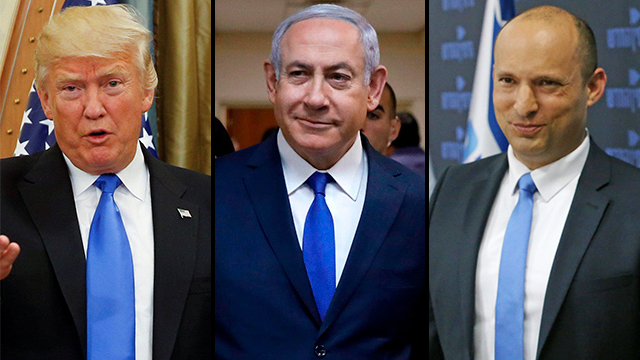
Caught in a Trump trap, Netanyahu pins his hopes on Abbas
Analysis: Bennett claims Netanyahu has already signed off on the terms of a US peace agreement, which he says includes creation of Palestinian state and division of Jerusalem, and the prime minister is now in the position of depending on the PA to save him from the fallout of such a dramatic departure from his usual poltiical rhetoric.
Prime Minister Benjamin Netanyahu is trapped in a spectacular manner. US President Donald Trump, not know for his conciliatory nature, expects something in return for his decision to move the US embassy to Jerusalem and recognizing the city as Israel's capital.
That concession by Israel, sources close to Netanyahu say, will be in accepting the "deal of the century" drafted by the US president, which reportedly has several clauses that the prime minister will find hard to swallow.
The sources say Netanyahu is actually counting on a Palestinian refusal to even consider the deal, given that Palestinian President Mahmoud Abbas has vowed to oppose any US peace proposal—but there is no certainty that it will actually happen.
Meanwhile, the head of the New Right party, Naftali Bennett, not only claimed on Sunday that Netanyahu intended to go along with Trump’s long-delayed peace plan, which includes an establishment of a Palestinian state, but also set a very tight deadline for the plan—intending to unveil it immediately after the April 9 elections.
Bennett has apparently based his assessments that the Americans will unveil the plan after the elections—but before the government is formed—as Trump wants the deal to be approved during coalition negotiations and subsequent political agreements.
Other reports also suggest that the Trump administration's peace plan will indeed be unveiled soon. The deal is expected to include the provision of establishment of a Palestinian state on 90 percent of the West Bank, including land-swaps and the division of Jerusalem.
Illegal outposts will be evacuated, and isolated settlements outside the so-called settlement blocs (that some argue will remain part of the Jewish state in any peace deal) will not be expanded. The holy places will remain under Israeli sovereignty but will be jointly managed by Israel, Palestine, Jordan and possibly other countries.
On Tuesday, Netanyahu will take off for Moscow to meet with Russian President Vladimir Putin, after postponing the trip last week in order to oversee the merger between the extreme-right Otzma Yehudit (Jewish Power) party and the Jewish Home. This will be the first official meeting between the two leaders since the downing of the Russian spy plane six months ago by Syrian forces who were trying to thwart an Israeli aerial attack in their territory.
"The issue of Iran will be at the top of our agenda," Netanyahu said at the start of the weekly cabinet meeting. "We will also discuss strengthening the security coordination mechanism between the IDF and the Russian army in order to maintain stability and prevent unnecessary friction in the region."
But international travel and foreign diplomacy aside, Netanyahu's biggest challenege appears to be at home, where he could well find himself pinning his political hopes on one of his greatest foes - the Palestinian leader.











